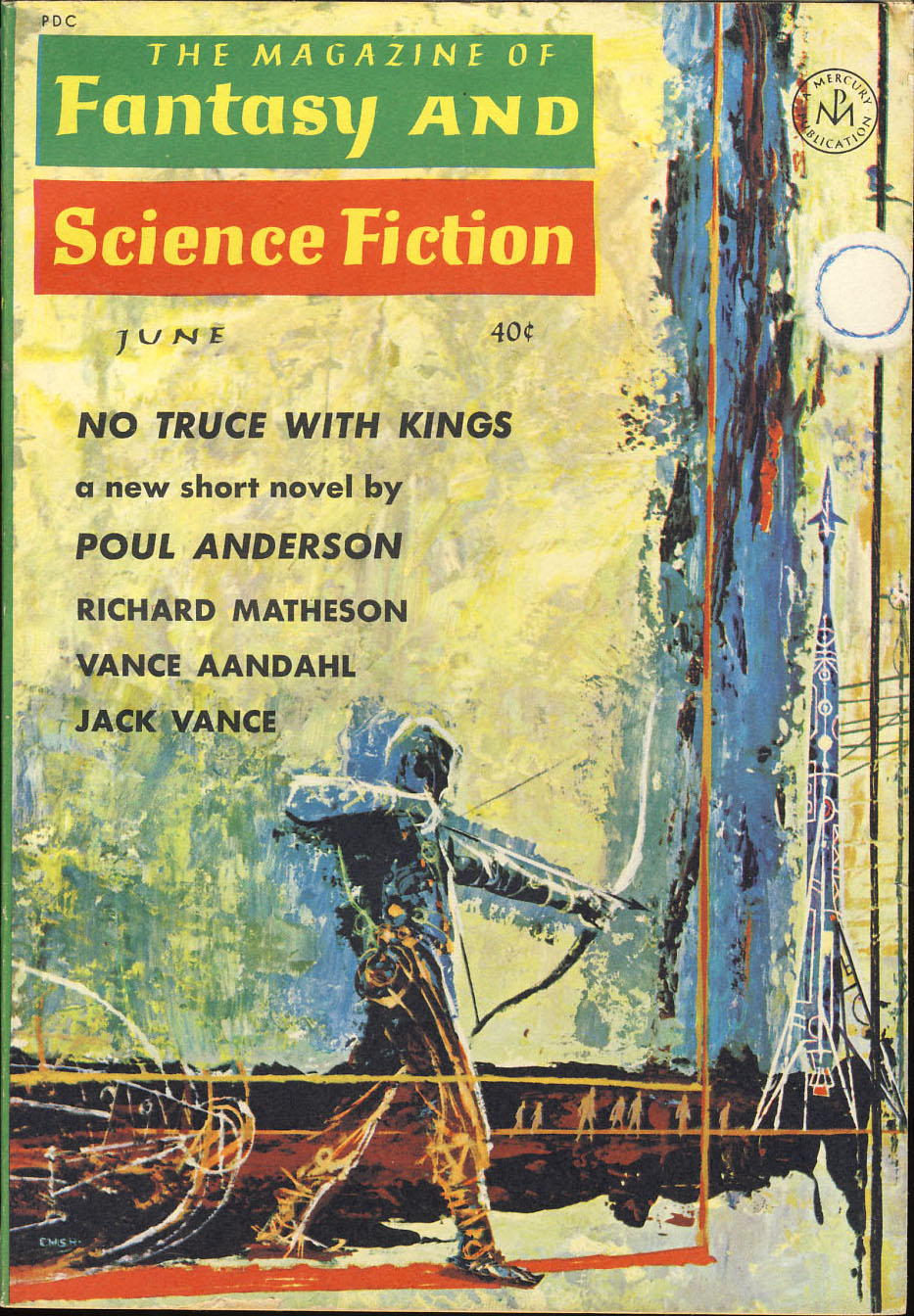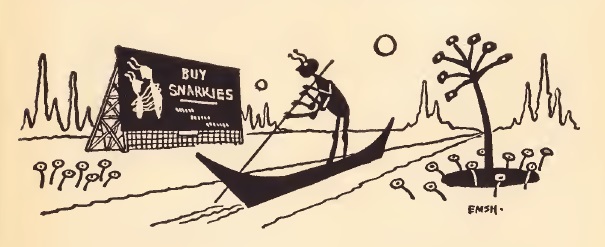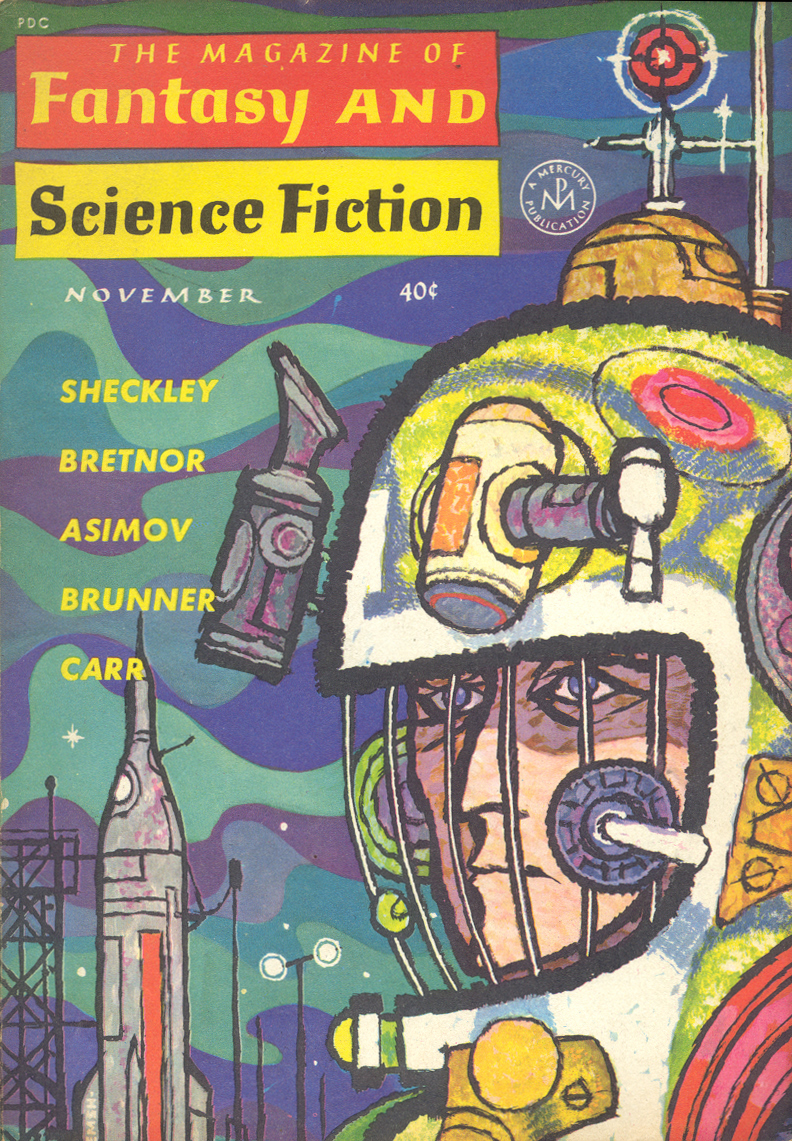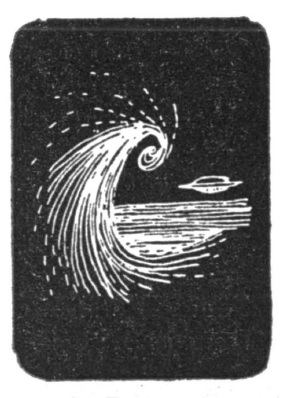KGJ Weekly News is back! Come watch and find our what happened this week

by Gideon Marcus
A small pond
We have exciting tidbits from both sides of The Pond today, so stay tuned for both. But first up, the latest issue of Fantasy and Science Fiction.
I got a letter from Ted White the other day. Seems he's no longer assistant editor over at F&SF, which is a shame. Apparently, he was once under consideration for editor at Fantastic (and possibly Amazing) back when Celle Goldsmith (Lalli) left! Boy, would that have been an interesting tenure–certainly more interesting than what we got under Sol Cohen.
Anyway, keep reading, because this isn't the only time Ted's name will come up.
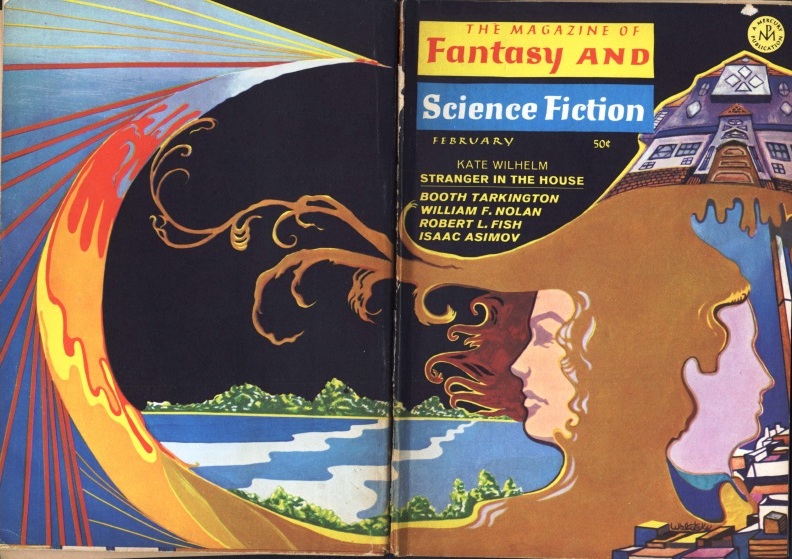
by Ronald Walotsky
The Colonies
Stranger in the House, by Kate Wilhelm
We've been seeing a lot more of Kate Wilhelm, lately, which is generally a good thing. Stranger seems as if it will be a fairly typical, if sinister, haunted house story. A middle-aged couple moves into a house in the country, a surprisingly good deal, to escape the hustle and bustle of the city after the husband suffers a heart attack. Immediately, the wife begins to suffer fainting spells and strange visions. A little research uncovers that, since 1920, the place has seen an inordinate number of deaths and inexplicable illnesses amongst its ocuppants.
Is it a vengeful spook? Radon poisoning? Actually, as we quickly learn, it's an alien in the basement. Not just any alien: this one was sent on a first contact expedition. The hope of its race was that they would get to see that transient moment when a species first makes the jump into space.
The problem is, said aliens are hideous, live in a toxic atmosphere, shed acid, and communicate via a telepathy that is about as conducive to human communication as an icepick in the forehead. How, then, can there be a meeting of the minds?
I love a good "first contact" story, and I appreciate that Wilhelm has created a truly alien being. What keeps this piece from excellence are a couple of factors. For one, it is overlong for what it does. More importantly, much of the story, particularly that told from the alien's point of view, is detached and told in past tense. This lack of immediacy in a story that deals with turbulent emotions puts a muffling gauze over the proceedings. I wonder, in fact, if the whole story might have been improved by only including the human viewpoint.
Three stars.
The Lucky People, by Albert E. Cowdrey
Why stay hitched to three channels on the boob tube when you can watch the cannabalistic mutants that prey on your neighbors from the comfort of your own picture window?
Notable for being the first mention of Star Trek I've seen in print science fiction, it is a cute but frivolous tale.
Three stars.
The Stars Know, by Mose Mallette
A young ad exec, graduate of Dr. Ferthumlunger's 40-week handwriting analysis course, is convinced that his boss, the comely Lorna D., is in love with him. How else to explain "the sex-latent capitals, the rounded n's and m's, the generous o's and a's, and the unmistakably yearning ascenders in late."
Never mind that the note which our hero has examined is an angry exhortation to get his work done on time.
The misunderstanding continues, with Lorna actually becoming infatuated with the exec, but said exec steadfastedly refuses to believe it, analysis of subsequent notes revealing (so he believes) that she isn't interested at all. Of course, he doesn't actually read the contents of the notes. He only looks at the handwriting.
What seems a silly story at first is actually, upon further analysis, an indictment of those who miss the forest for the trees: the mystics, numerologists, saucer enthusiasts, and what have you, who ignore the evidence and invent their own patterns to reinforce their beliefs. It's really quite brilliant satire!
Or…perhaps I'm reading too much meaning into the thing.
Three stars.
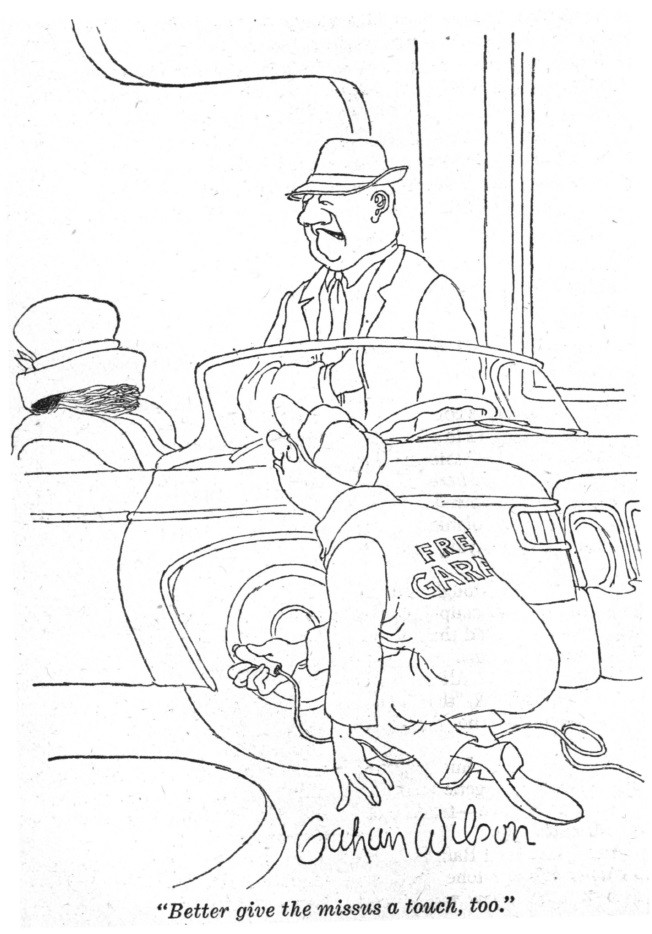
by Gahan Wilson
Aperture in the Sky, by Theodore L. Thomas
Thomas' essays are usually not worth the single page they are written on. This time, however, he's hit on a good'n: artificial satellites designed to occult radio sources for better measurement of their distance. It sounds rather brilliant to me.
Four stars.
From a Terran Travel Folder, by Walter H. Kerr
Less successful is this one page program, I think advising aliens on the joy of eating people. I read it a few times and did not find myself enjoying it.
Two stars.
He Kilt It with a Stick, by William F. Nolan
Then we hit the nadir of the issue. The author of Logan's Run offers up a tale of a man who hates cats and does horrible things to them until they get their inevitable, macabre revenge.
Not only is this story cliché in the extreme, but if I never read another account of cruelty to cats, it'll be too soon.
One star. For shame.
Wednesday, Noon, by Ted White
Quality returns with this short piece by Ted White. When the rapture comes, the music may not be heavenly in origin, but it'll be compelling, all the same. This story took a whopping three and a half years to be printed from the date of submission (latter 1964), but I'm glad it finally made it. White has a real knack for living in his characters, conveying their sensory experience and internal monologues with visceral effectiveness. Wilhelm's piece could have used his touch, I think.
It helps that White lives in New York, the setting of the story, and lived through that brutal summer when Martha Reeves' classic first hit the airwaves…
Four stars.
The Locator, by Robert Lory
Gerald Bufus, accountant, is meticulous to the extreme. He also has a hobby: tracking the visitations of flying saucers to ensure he can one day be present at a landing. Sadly, his overwhelming addiction to symmetry compells him to greet the alien ship at the exact center of their predicted arrival site.
Three stars.
I Have My Vigil, by Harry Harrison
The three human crewmembers of the first interstellar flight go mad in hyperspace, and presently, none are left alive aboard the vessel except the one robot steward, who mechanically goes through the motions of serving the dead humans.
The twist at the end is ambiguous: has the robot also gone insane? Or is he actually a fourth crewmember, who has retreated behind a fictional metal shell in his own kind of insanity?
Four stars.
To Hell with the Odds, by Robert L. Fish
I love "deal with the Devil" stories, and this one, about a washed-up golfer who bargains to win this year's Open, is great all the way up to the end…where it flubs the finish. The problem I have is the clumsy phrasing of his final wish (an attempt to get out of the deal, which of course backfires,) given that he had 18 holes to perfect it.
Three stars.
The Predicted Metal, by Isaac Asimov
The Good Doctor continues his series on the discovery of metals, this time recounting the creation of the Periodic Table. It's a fine piece, but I feel as if it was recycled from his 1962 book, The Search for the Elements.
Four stars.
The Veiled Feminists of Atlantis, by Booth Tarkington
The last is a 40-year old piece. Two scholars meet to discuss a legend of Atlantis in which the women not only win equality, but then fight a cataclysmic war with Atlantean men for the right to retain the distinction of their femininity–the veil.
Tarkington wrote the piece to poke a bit of fun at the war between the sexes that was waging in the 20s, whereby women had the temerity not only to demand the vote, but also to engage in male or female fashion and hobbies as they chose, and men were affronted by their cheek.
Interesting as an artifact, I suppose. Three stars.
Summing up
All in all, a decent but not outstanding magazine this month. And now onto something in an entirely different vein…

by Fiona Moore
At the outset of The Magical Mystery Tour, which premiered in black and white on Boxing Day but which was released in colour on 5 January this year, we are promised the “trip of a lifetime,” and, later on, we are assured that everyone is “having a lovely time.” Whether or not this includes the viewer is more open to question.
 The Mystery Bus attempting to flee its critics.
The Mystery Bus attempting to flee its critics.
The movie has the loose framing premise of Ringo Starr taking his Auntie Jessie on a Mystery Bus tour, in the company of the other Beatles, a few swinging hip types, an assortment of British pensioners who seem a little nonplussed by the proceedings, and The Courier, a Number Two figure who leads the tour assisted by Miss Winters and Alf the Driver. What follows is a series of short musical interludes featuring a selection of numbers from the eponymous album, interspersed with sketches that are a cargo-cult cross between At Last The 1948 Show and The Prisoner, which seem to miss the point of either.
There’s a sketch with a sergeant-major drilling the tour participants; a sort of school games’ day and car race around an airfield or test track (featuring Angelo Muscat, the Butler in The The Prisoner); a whirlwind romance between Auntie Jessie and a character named Buster Bloodvessel; a tent in a middle of a field that turns out to be bigger on the inside than on the outside. But no real sense of what all this is supposed to be saying to the audience.
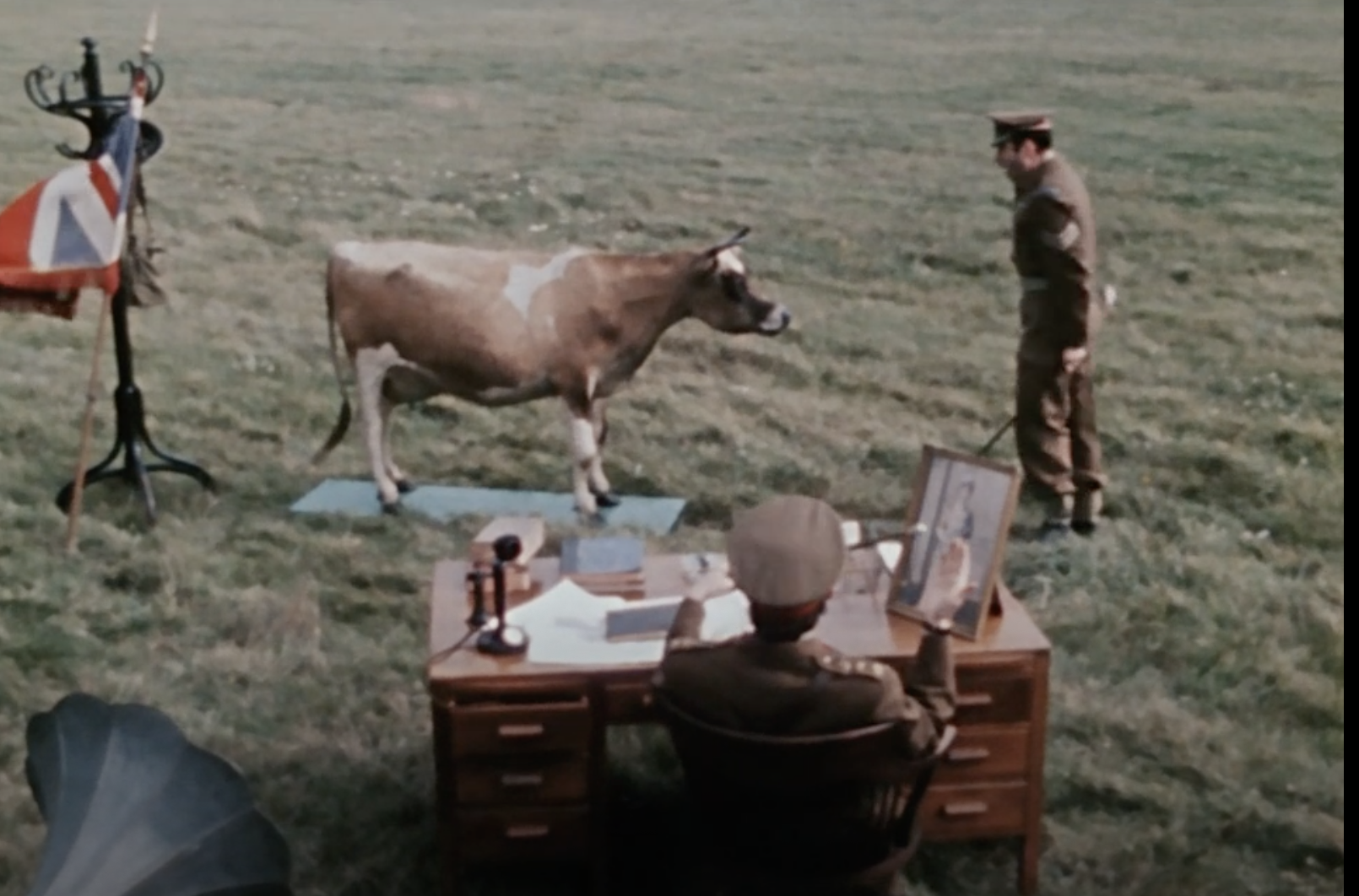 Yes, but why?
Yes, but why?
The highlights of the film are definitely the musical interludes. “Flying”, when seen in colour, is actually rather beautiful (which is rather lost in the black and white version). There are also short films for “Blue Jay Way,” featuring George Harrison playing on a chalk-drawing piano, and “Fool on the Hill”, with Paul McCartney standing on, well, a hill. Everything really comes together, though, in “I Am the Walrus”, with the surreal costumes of the performers echoing the imagery of the song, and the Beatles all seem to be enjoying themselves. This is far from true of the other sketches, in which John and, in particular, George seem more than a little surly.
 Everyone having a lovely time, apparently.
Everyone having a lovely time, apparently.
The film hit its nadir, for me, with a rather disgusting dream sequence of Auntie Jessie being served mountains of sloppy spaghetti by John Lennon in a restaurant, while the bus crew sit around half-naked drinking milk. Similarly peculiar was the decision to have a sequence where the Bonzo Dog Doo-Dah Band perform their song “Death Cab for Cutie” in a strip club complete with stripper, watched by George and John. And the movie more or less ends right there, with that sequence going straight into a 1950s Hollywood-musical-style production of “Your Mother Should Know.”
I’d say this is definitely one for Beatles completists more than anything else.
Two out of Five stars.
KGJ Weekly News is back! Come watch and find our what happened this week

![[January 22, 1968] The Magical Mystery Tour (February 1968 <i>Fantasy and Science Fiction</i>…plus the Beatles movie!)](https://galacticjourney.org/wp-content/uploads/2023/01/680122both-672x372.jpg)

![[February 16, 1965] Return to a Quagmire (March 1965 <i>Fantasy and Science Fiction</i>)](https://galacticjourney.org/wp-content/uploads/2020/02/650214cover-672x372.jpg)






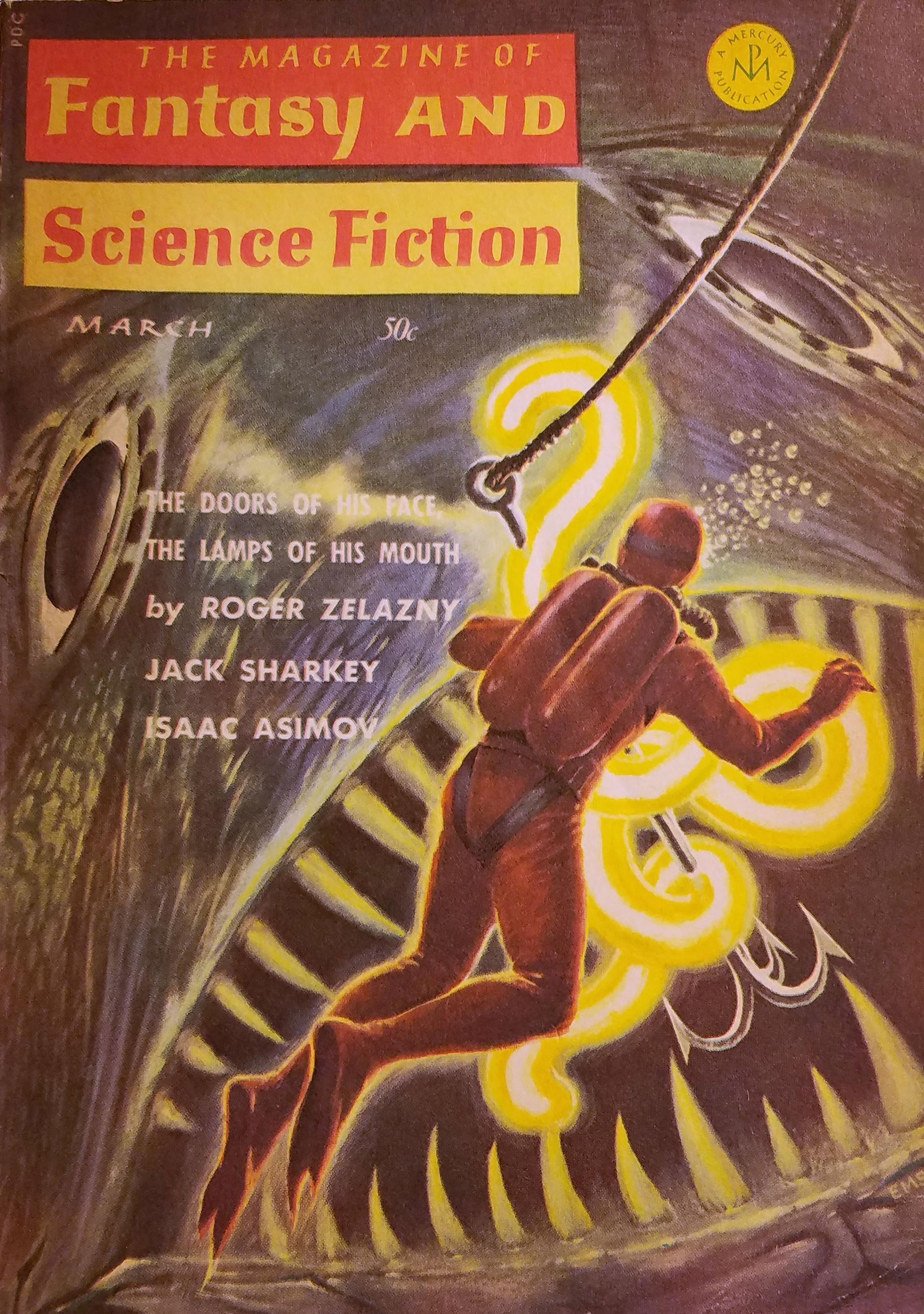

![[November 19, 1964] Ding Dong (December 1964 <i>Fantasy and Science Fiction</i>)](https://galacticjourney.org/wp-content/uploads/2019/11/641119cover-425x372.jpg)


![[October 20, 1964] The Struggle (November 1964 <i>Fantasy and Science Fiction</i>)](https://galacticjourney.org/wp-content/uploads/2019/10/641020cover-660x372.jpg)
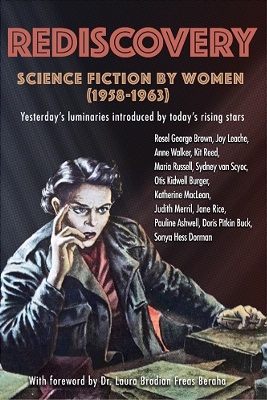








![[August 21, 1963] Forgettable (September 1963 <i>Fantasy and Science Fiction</i>)](https://galacticjourney.org/wp-content/uploads/2018/08/630818cover-672x372.jpg)



